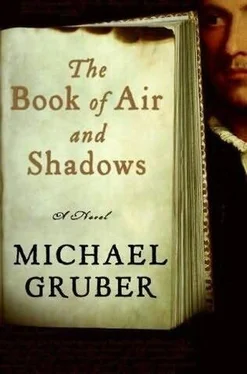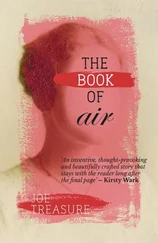The good news, from your perspective, is that I was able to sell the maps and plates from the broken Churchill for what I believe was a far higher price than we would have received on the American market-3,200 British pounds! They seem to have an insatiable appetite here for good-quality prints from their glory days. I enclose an international money order for $5,712.85. I paid the various fees out of my pocket, to make up for any inconvenience you might have suffered.
Do say good-bye to Mrs. Glaser for me and to Albert. You’ve all been far kinder to me than I deserved.
Best,
Carolyn Rolly
Crosetti handed the letter back with lead in his belly. He had to clear his throat heavily before saying, “Well. Good for her. I didn’t know she had family in England.”
“Oh, yes,” Glaser replied. “She once mentioned that the name was originally Raleigh, as in Sir Walter, and she implied that there was some connection to the famous one. Maybe she inherited the family castle. That’s quite a sale, anyway. I always figured our Carolyn was heading for higher things than bookstore clerking. Did you print out those auction notices I wanted?”
“This morning. They should be in your in-box.”
Glaser nodded, grunted an acknowledgment, and walked off, and Crosetti clumped down the stairs to his cave. It was a more pleasant work environment than it had been before the fire, for the insurance had paid for a complete renovation, including neat steel shelves and a new Dell computer with all the latest stuff attached. The cellar now smelled of paint and tile adhesive instead of dust and cooking grease, but the improvement did not noticeably help Crosetti’s mood. Each time “How could she?” appeared in his mental theater, the answer came swiftly: “Schmuck! You had one date. What did you expect, love forever? She got a better deal and split.” On the other hand, there was Crosetti’s devout belief that the body never lied, and he could not accept that Rolly had lied to him in that way, that one night. She was a liar, sure, but he could not accept that sort of falsehood. Why should she? To repay him for a nice evening? It made no sense.
And speaking of lies, went the inner voice, that letter was complete horseshit. We know she didn’t break those volumes, therefore didn’t sell the prints. He was as sure of that as he was about the honesty of the flesh. So where did she get the nearly six grand she paid out to Glaser? Answer: someone supplied it, plus the costs of travel to England, and for this the only suspect was Professor Bulstrode, for there was no one else on the scene who both had that sort of money and was in England. She had gone to England with Bulstrode. But why? Kidnapped? No, that was absurd: professors of English did not kidnap people except in the sort of preposterous movies that Crosetti despised. Then why did she go?
Two possibilities presented themselves, one unpleasant, one frightening. The unpleasant possibility was that Carolyn saw the opportunity for a big score, the possibility of actually finding the supposed Shakespeare treasure. She’d read Bracegirdle’s letter and called Bulstrode behind Crosetti’s back (that long wait outside her loft!), set up the sale of the Bracegirdle manuscript, pressured Crosetti to sell, and then-he wanted to think-fallen a little in love but not quite enough to make her willing to miss the opportunity to get out of a life of crushing poverty.
The frightening possibility was that she was acting under duress, that Bulstrode had something on her, a threat far worse than just losing her clerk’s job and having to deal with the cops. No, that was another lie-the cops were not after any Carolyn Rolly, not according to his sister anyway. But maybe it was a little of both, a carrot and a stick. He had to have new information. Information was what allowed you to separate the lies from the truth.
As soon as this thought appeared, Crosetti swiveled in his chair and faced his new computer. He actually did have some new information, and because of the moping he’d been doing lately he hadn’t thought to use it. From the back pocket of his jeans he extracted the two items he had scooped from the street outside Carolyn’s former home. The photograph was a one-hour-photo print of two women and two children, a boy of four or so and a baby girl. One of the women was a younger Carolyn Rolly, with her hair jammed up under a feed cap, and the other woman was a pretty blonde. They were sitting on a bench in some kind of park or playground, in summer sunshine, the trees around them, heavy with leaf, throwing dark shadows on the ground. They were looking at the photographer and smiling, with the sun in their faces making them squint slightly. It was not a good photograph; Crosetti knew that the cheap instant camera it was taken with could not deal with the contrast between bright sun and shade, and so the faces were washed out, especially those of the kids. But Carolyn had kept it and then walked away from it, as if abandoning her life once again. He studied the silvery faces, looking for signs of family connections, but again there was too little information.
He scanned the photograph into the computer, called up PhotoShop, and played with the contrast for a while, and then downloaded a program he’d used before that enhanced just such photos, using statistical methods. The result was a better look at the family, because now it was clear that it was a family. This had to be Carolyn’s sister, or at least a first cousin, and the two kids were clearly related to either or both of the women. Crosetti could not have said exactly why he knew this, but he was from a large family, and from a social and ethnic stratum where large families were common, and the fact was instinctively clear to him.
The picture on the postcard bore the legend CAMP WYANDOTTE done in what was supposed to look like birch sticks, and depicted a fir-lined mountain lake, a dock, and some boys canoeing. The message side had a three-year-old postmark and said, in childish block printing: Dear Mommy Im haveing a good time at camp. We catched a snake. I love you Emmett. It was addressed, in an adult hand, to Mrs. H. Olerud, 161 Tower Rd., Braddock PA 16571.
Turning to the computer, Crosetti generated a map of the address, which turned out to be in western Pennsylvania, near Erie. He used Google-Earth on the address and brought up the roof of a modest frame house with outbuildings, surrounded by scrubby woodlands. Zooming out from that image showed a semirural neighborhood like those that surround the smaller, tired towns of the American Rust Belt: five-acre plots, broken cars and appliances in the yards, woodpiles: scruffy zones inhabited by people who used to have good manufacturing or mining employment and now barely got by on sporadic work or McJobs. Did this milieu spawn the exotic creature that was Rolly? He looked again at the photograph of the two women and the kids at the playground and wished that he were thirty years in the future when Google (he was sure) would let you google the interiors of all the houses and study the faces of all the inhabitants of the planet. At present, however, a journey would be required.
BRACEGIRDLE LETTER (8)
We crost the seas with fayre windes until 23 rdJuly when the skye came all over black as night & commense a greate wind. The fleete wase scattered entirelie & oure ship drave upon a rock & wracked but through the mercie of God none perished save three men & Mr Tolliver one of them, may God have mercie on his sowle & now is all his quizzing done for he seeth face to face. When the storm abates wee had greate feare for wee find we are upon the Bermoothes, which all mariners dight Isle of Devils, for dwelleth salvages there that eate mens fleashe or soe twas thought. But we landed having no other choyce & found not salvages but a place near to Paradise, waters, meadowes, fruite trees &c. with pleasaunt flowered aires most swete. Was good cedern timber abounding too & wee set to building two boates fit to carry all o’ wee & passed there near one yeare before sayling & I gayne greate credit for steeryng by starres and Sun & did arrive with the Lords holpe at Jamestown 23rd Maye the Yeare Ten. All this tale has been tolde before in bookes wrote by Mr Wm Strachey of oure partie which you have read, soe I will saye no more of this.
Читать дальше












